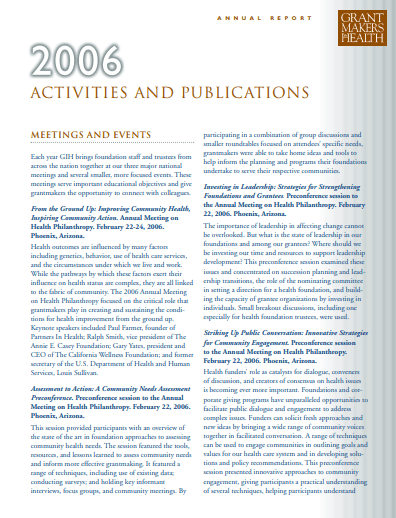“Replication” Local Style: A Philadelphia Story
Adapting a program model that works in one place requires knowing which elements can be modified, which cannot, and how to line up home support.
Annual Report 2006
GIH’s 2006 Annual Report document’s the organization’s programmatic and financial activities.
Key Issues in Reauthorization of the State Children’s Health Insurance Program
Over the last 10 years, the State Children’s health Insurance Program (SCHIP), which now covers 6 million children, and Medicaid, which covers 28 million children, have deceased the uninsured rate of low-income children by one-third. While there is broad bipartisan support for SCHIP, several key issues have emerged during the reauthorization process, including how the program should be financed, who should be covered, and what that coverage should include.
Knowledge to Action: Plenary Addresses from GIH’s 2007 Annual Meeting
This report comprises keynote addresses from GIH’s 2007 annual meeting Knowledge to Action: Applying What We’ve Learned to Improve Health. The volume includes speeches by GIH President Lauren LeRoy, former Arkansas governor Mike Huckabee, as well as panels on HIV/AIDS and critical health issues over the last 25 years.
Considering Quality: Engaging Consumers to Make Better Health Care Decisions
This Issue Brief examines the potential of consumers to use information to select high-quality health services and to become drivers of quality improvement at the systems level. Information tools for consumers, such as report cards on health plans and providers, decision support aides, and the Internet are discussed. It also takes a look at the roles foundations can play in developing and disseminating quality information for consumers, such as developing quality indicators; assessing the effectiveness of information technology, including the Internet; and funding advocacy efforts to ensure consumers have the information needed to make appropriate health care choices.
Reversing the Obesity Epidemic: Policy Strategies for Health Funders
This report presents the rationale for using policy approaches to change food and physical activity environments. The report highlights the efforts of health funders supporting policy change in schools, food systems and sustainable agriculture, the built environment, and across communities. It also briefly examines trends and opportunities in health systems, workplaces, and state programs, and concludes with a discussion of challenges and opportunities for moving forward.
Knowledge to Action
This resource book, prepared in celebration of GIH’s 25th anniversary, takes a look at 10 critical health issues, considering both changes in the health sector and in health policy over 25 years and the work of health foundations in addressing these challenges.
Making the Most Out of Community Advisory Committees
Lessons from conversion foundation CACs can inform other foundations’ efforts to elicit community input.
Improving Health Care Access: Grantmakers Share Their Experiences
This report is a collection of profiles that tells the stories of how health funders across the country are working to improve access to health care. With these profiles, we have attempted to capture the priorities, funding strategies, accomplishments, and challenges of a cross section of grantmakers, giving readers a place to look for insights that they can adapt to their own circumstances. Download the full report or the executive summary.

